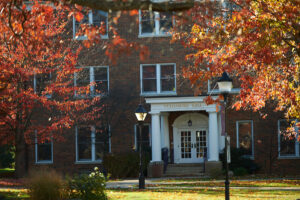Albion College to Serve as Administrative and Research Home for Carnegie Classifications
Prestigious national designations represent the best in institutional diversity in higher education
November 22, 2021

The Basic Classification, which has served as the leading framework for recognizing and describing institutional diversity in U.S. higher education for more than 40 years, will move to Albion College in the Spring of 2022.
Albion College, one of the top 50 innovative liberal arts colleges in the country, announced today that the College will assume operational and administrative responsibilities for the Carnegie Classifications, including the Carnegie Classification of Institutions of Higher Education® and the Elective Classification for Community Engagement®. Albion College President Dr. Mathew Johnson made the announcement.
“Situating these classifications at Albion College speaks to the College’s future-focused approach to curriculum advancement and student success beyond the classroom,” said Johnson, who has worked with the Foundation as a Visiting Fellow and as Director of the Elective Classification for Community Engagement. “At Albion, we understand well the responsibilities of institutions of higher education to create thoughtful students who make lasting impacts on society. With these classifications in place, we are prepared to deliver on that commitment more effectively than ever before.”
The Elective Classification for Community Engagement has been housed at Albion since July 2020. The movement of the Basic Classifications to Albion College will build on this partnership. Albion College will launch the Commission on Public Purpose in Higher Education (CPPHE) to serve as the administrative and research home of the Carnegie Classifications and to actively engage in initiatives that explore the public purpose of higher education through collaboration with students, faculty, institutions of higher education, community partners, and networks for community engagement and social innovation.
“Albion College is an ideal example of an institution transforming the educational experience by uncovering opportunities and solutions previously unseen,” said Paul LeMahieu, senior vice president of the Carnegie Foundation for the Advancement of Teaching. “Through its focus on community engagement and public serving scholarship, Albion is well-positioned to continue to make an impact on the greater academic landscape. Operational and administrative leadership of the Carnegie Classifications is one excellent example of this.”
The Carnegie Classification of Institutions of Higher Education (also known as the Basic Classification) has been the leading framework for recognizing and describing institutional diversity in U.S. higher education for the past four and a half decades. In 1970, the Carnegie Commission on Higher Education developed a classification of colleges and universities to support its program of research and policy analysis. The framework has been widely used in the study of higher education, both as a way to represent and control for institutional differences in research, and also in the design of studies to ensure adequate representation of sampled institutions, students or faculty. The Basic Classification has been administered by Indiana University since 2014 and will move to Albion College in the Spring of 2022.
In addition to stewarding the Basic Classification, the Carnegie Elective Classification for Community Engagement in the U.S. and pilot projects to develop Carnegie Elective Classifications for Community Engagement in Canada and Australia, CPPHE is partnering with the Doerr Institute for New Leaders at Rice University to establish a new Elective Classification for Leadership for Public Purpose. The Doerr Institute recently completed a pilot study with eight founding institutions and will establish the new Classification and its central framework for application beginning in Spring 2022.
For more information, visit albion.edu and carnegiefoundation.org.
About Albion College
Albion College is a private liberal arts college of approximately 1,500 students and is nationally recognized for its academic excellence in the liberal arts tradition, a learning-centered commitment and a future-oriented perspective. The College is a leader in preparing students to anticipate, solve and prevent problems in order to improve the human and global condition. Albion immerses students in the creation and processing of knowledge and graduates skilled architects of societal change, active citizens and future leaders. The College is dedicated to the highest quality in undergraduate education and is committed to diversity as a core institutional value.
Albion, Michigan is a culturally diverse community in the south-central part of the state. The College recognizes the value of community, both on- and off-campus and has invested resources in supporting the revitalization of the greater Albion community. This work offers an increasingly vibrant city around the campus that provides students with a fuller experience as they prepare to become engaged citizens in their own communities. For more information, visit albion.edu.
About the Carnegie Foundation for the Advancement of Teaching
The mission of the Foundation is to catalyze transformational change in education so that every student has the opportunity to live a healthy, dignified, and fulfilling life. For more information, visit carnegiefoundation.org.